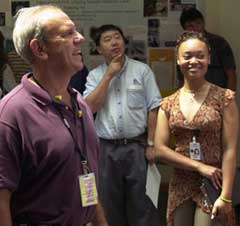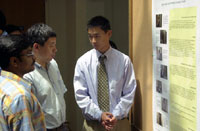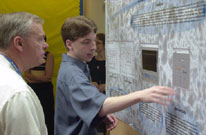Newport News, VA. — As schools close for the summer, the number of teachers and high school and college students at the Department of Energy's Jefferson Lab in Newport News, Va., multiplies. They come to participate in a variety of innovative, educational, science-based programs.
High School seniors arrive for the Lab's summer honors program. College students preparing to become the nation's next generation of science teachers arrive for the new Pre-Service Teachers program, or for a Science Undergraduate Laboratory Internship, which is geared toward undergraduates who are pursuing a career in science or technology. Middle-school science teachers arrive to participate in the Teacher Academy in Physical Science experience.
The High School Summer Honors Program, or HSSHP, gives students the opportunity to work with mentors in scientific or technical areas of Jefferson Lab for eight weeks. Students chosen for these positions are strong in math, science, and/or computer science and are interested in pursuing math, science, physics, computer science, engineering, or other technical careers. The program provides professional mentoring and experience in a science-research environment. Students are assigned a project and complete a paper and prepare a presentation poster on their work.
More than 100 applications are received annually for the dozen or so openings. (The number varies between 10 and 13 from year-to-year based on funding availability). Through HSSHP, some of the brightest students in the region take part in activities across the JLab campus, including accelerator engineering, experimental research, free-electron laser projects and computer programming.
The Science Undergraduate Laboratory Internship, or SULI, program is geared toward college students who are pursuing a career in a science or technology field. The 10-week internships are designed to support the intellectual and professional development of students who have a sincere desire to be fully involved in a program that offers an intensive, mentored, scientific research experience. They also are assigned a project and complete a paper and prepare a presentation poster on their work.
The Pre-Service Teachers, or PST, program is new to JLab this summer. The 10-week internships provide educational training, mentorship and research experiences for undergraduate students preparing to become K-12 science teachers. Each student attends lectures, develops lesson plans and hands-on projects that can be used in the classroom, and completes a project. Each participant has two mentors, a local physics teacher and a Jefferson Lab scientist.
And the Teacher Academy in Physical Science, or TAPS, is a three-week program for upper elementary and middle school teachers. The program offers a course in basic physics (50 hours), guest lectures on current research by Jefferson Lab staff (20 hours), workshops on improving physical science instruction at the middle school level (20 hours), and team-based hands-on explorations under the guidance of JLab staff (70 hours). The purpose of the program is to enhance physical science instruction at the middle school level, according to Jan Tyler, JLab's Science Education program manager.
The goals of the program are to enhance teacher content knowledge and skills, including leadership skills; increase teacher awareness and ability to communicate with their students about current issues in science and technology; build teacher competence and confidence by offering teachers an opportunity for revitalization and recognition; and support the inclusion of each teacher as a valued member of the professional science and technology community. Teachers completing the program receive recertification points, and can even earn graduate credits through the University of Virginia.
Forty-five individuals are participating in this summer's science education programs at Jefferson Lab. While most of the participants are from the region, many traveled great distances — some from as far away as Utah and Minnesota — to participate in these programs, Jan Tyler notes.
The student programs run through August 6. They will share their summer experience at JLab during a Poster Session on August 4, where they will explain their projects to Jefferson Lab scientists.
Each of these educational enrichment programs is included in Energy Secretary Spencer Abraham's recently announced STARS: Scientists Teaching and Reaching Students program. The Department of Energy (DOE) and its national laboratories launched the nation-wide initiative on July 8 to promote science literacy and help develop the next generation of scientists and engineers.




